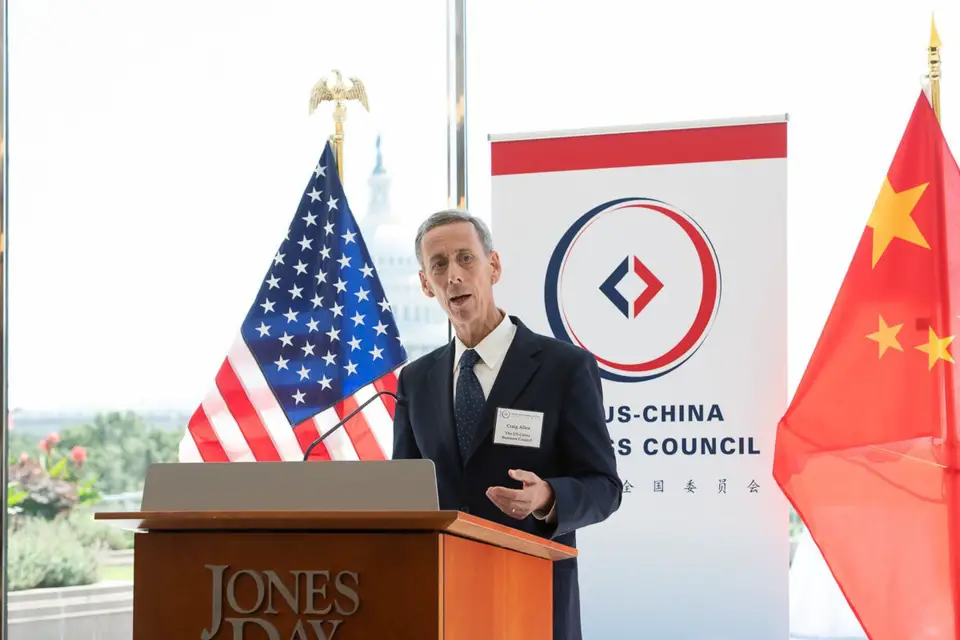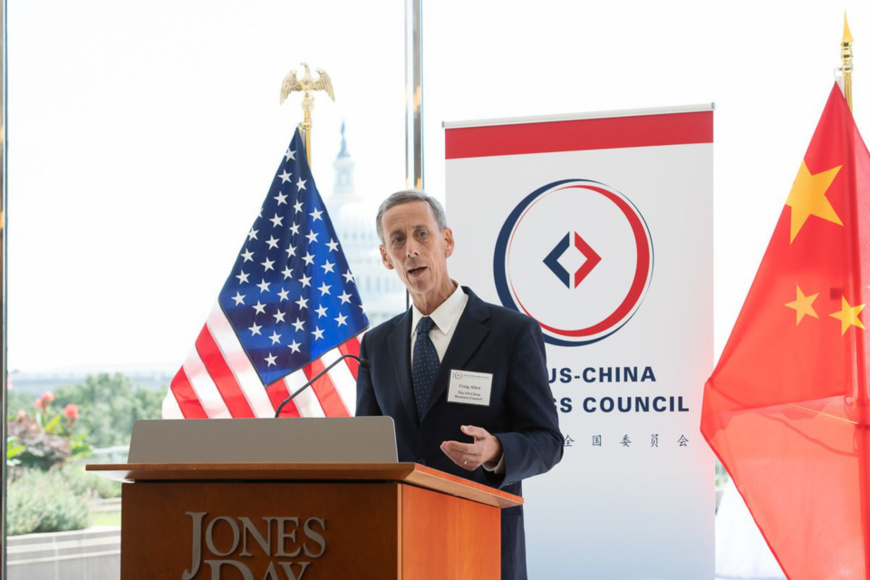By Wu Lejun from People's Daily
Editor’s note: Craig Allen, the president of the US-China Business Council (USCBC) since July, was exclusively interviewed by the People’s Daily, and discussed US-China trade frictions.
Washington (People's Daily) - Craig Allen thinks himself a “lucky guy” to have the opportunity to lead the US’ top China-focused business association during this challenging period. “Someone once said, you never want to waste a good crisis. What we really want to do is to come out of this period of incredible tension with a better relationship, a better trading environment going both ways for both countries”.
From Allen’s point of view, US-China ties are the most important in the world.
“Our two countries are the world's largest economies and growing very quickly. In addition to that, we're highly interdependent”, he added. When you look at it from a global perspective, you will realize that there are many global problems that cannot be resolved without US-china cooperation, such as climate change, infectious diseases, and terrorism effects.
Talking about the US-China trade deficit, Allen finds there are some multilateral and bilateral reasons for that. He said you will have a trade deficit if you save too little, and if you save too much you will have a trade surplus. China has had a trade surplus and the United States has had a trade deficit for many years. And that is fundamentally a result of this equilibrium between savings, investment, and consumption. On the bilateral side, he said China’s trade surplus as a percentage of GDP has gone down, and is very good. US has a trade deficit around the world with many countries. So China is not the only country that shows the US has insufficient savings.
“We disagree with the use of tariffs as a tool of trade diplomacy”. “The longer the tariffs are in place, the more damage is done to the US and Chinese economies,” Allen noted.
Allen sees China less dependent on exports as a percentage of GDP growth than in the past. “But I do think there are certain industries within China that can’t get along with that”. He said there are some regions in China that are more dependent on the US export market and those regions might be more deeply impacted than the overall Chinese economy. “But I suspect that the Chinese economy will continue to grow robustly despite the trade war. The economy is growing at maybe twice the rate of the US economy”, he added.
On the tariffs’ impact to the US economy, Allen has a similar view with most economists. US tariffs on Chinese exports are attacks on US consumers and US businesses. “Tariffs will reduce choices. One thing that worries me is this will affect those with lower incomes more than higher incomes because those with lower incomes have fewer choices. I think that this will disproportionately affect them”.
Allen’s other concern is many American companies are deeply interdependent with their Chinese counterparts. Many American manufacturers will import parts, components, equipment and raw materials from China. “I worry about those companies that have a long relationship. Some of them can be replaced with imports from other countries or domestic products, others will be more difficult to replace.” It also impacts US exports, as products will be more expensive.
Statistics show that global trade is slowing, while exports of US goods and services to China continue to outpace exports to other major markets. On average, US exports to China grew by 8 percent annually over the past 10 years, despite the modest decline over the past two years versus 2014. US services exports to China grew more rapidly than all other major trading partners, averaging nearly 19 percent annually over the last decade.
“In my view, the tariffs don't really help with the goal of reassuring American manufacturing. The tariffs on manufacturing will probably be negative,” he added. Tariffs also don't help the global economy. I'm particularly concerned with emerging markets. There is already a lot of stress in currencies, in South Africa, Turkey, Argentina, and other emerging market countries. All these countries are important.
According to the 2018 Member Survey released by USCBC in September, China remains an important market for American companies. Most American companies invest in China to access and compete for Chinese customers, and China remains one of the top priority markets for 90 percent of US companies. Most plan to maintain or invest in China next year.
“American companies invested in China in the long term, and those companies have a stake in the bilateral relationship, and we want to grow our businesses. But that becomes much more difficult with tariffs on both sides. Now, every company is affected in different ways”, Allen said, hoping the robust negotiating takes place, and to find resolutions of market access, intellectual property right protection and technology transfer that US government claimed. “These tariffs can’t be forever, and we need to resolve the situation quickly”, Allen said.
Washington (People's Daily) - Craig Allen thinks himself a “lucky guy” to have the opportunity to lead the US’ top China-focused business association during this challenging period. “Someone once said, you never want to waste a good crisis. What we really want to do is to come out of this period of incredible tension with a better relationship, a better trading environment going both ways for both countries”.
From Allen’s point of view, US-China ties are the most important in the world.
“Our two countries are the world's largest economies and growing very quickly. In addition to that, we're highly interdependent”, he added. When you look at it from a global perspective, you will realize that there are many global problems that cannot be resolved without US-china cooperation, such as climate change, infectious diseases, and terrorism effects.
Talking about the US-China trade deficit, Allen finds there are some multilateral and bilateral reasons for that. He said you will have a trade deficit if you save too little, and if you save too much you will have a trade surplus. China has had a trade surplus and the United States has had a trade deficit for many years. And that is fundamentally a result of this equilibrium between savings, investment, and consumption. On the bilateral side, he said China’s trade surplus as a percentage of GDP has gone down, and is very good. US has a trade deficit around the world with many countries. So China is not the only country that shows the US has insufficient savings.
“We disagree with the use of tariffs as a tool of trade diplomacy”. “The longer the tariffs are in place, the more damage is done to the US and Chinese economies,” Allen noted.
Allen sees China less dependent on exports as a percentage of GDP growth than in the past. “But I do think there are certain industries within China that can’t get along with that”. He said there are some regions in China that are more dependent on the US export market and those regions might be more deeply impacted than the overall Chinese economy. “But I suspect that the Chinese economy will continue to grow robustly despite the trade war. The economy is growing at maybe twice the rate of the US economy”, he added.
On the tariffs’ impact to the US economy, Allen has a similar view with most economists. US tariffs on Chinese exports are attacks on US consumers and US businesses. “Tariffs will reduce choices. One thing that worries me is this will affect those with lower incomes more than higher incomes because those with lower incomes have fewer choices. I think that this will disproportionately affect them”.
Allen’s other concern is many American companies are deeply interdependent with their Chinese counterparts. Many American manufacturers will import parts, components, equipment and raw materials from China. “I worry about those companies that have a long relationship. Some of them can be replaced with imports from other countries or domestic products, others will be more difficult to replace.” It also impacts US exports, as products will be more expensive.
Statistics show that global trade is slowing, while exports of US goods and services to China continue to outpace exports to other major markets. On average, US exports to China grew by 8 percent annually over the past 10 years, despite the modest decline over the past two years versus 2014. US services exports to China grew more rapidly than all other major trading partners, averaging nearly 19 percent annually over the last decade.
“In my view, the tariffs don't really help with the goal of reassuring American manufacturing. The tariffs on manufacturing will probably be negative,” he added. Tariffs also don't help the global economy. I'm particularly concerned with emerging markets. There is already a lot of stress in currencies, in South Africa, Turkey, Argentina, and other emerging market countries. All these countries are important.
According to the 2018 Member Survey released by USCBC in September, China remains an important market for American companies. Most American companies invest in China to access and compete for Chinese customers, and China remains one of the top priority markets for 90 percent of US companies. Most plan to maintain or invest in China next year.
“American companies invested in China in the long term, and those companies have a stake in the bilateral relationship, and we want to grow our businesses. But that becomes much more difficult with tariffs on both sides. Now, every company is affected in different ways”, Allen said, hoping the robust negotiating takes place, and to find resolutions of market access, intellectual property right protection and technology transfer that US government claimed. “These tariffs can’t be forever, and we need to resolve the situation quickly”, Allen said.
 Menu
Menu
 Craig Allen: The longer the tariffs are in place, the more damage is done
Craig Allen: The longer the tariffs are in place, the more damage is done

















